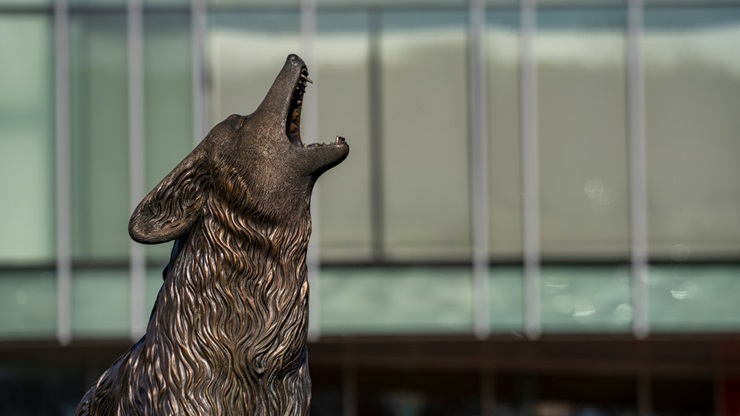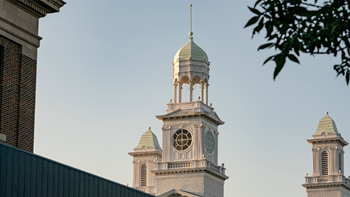From The Volante to CNN, USD Alumnus Writes His Own Story

Arriving at USD in the fall of 2006, Kludt initially majored in mass communications before switching to a double major in political science and history—two fields he said he was slightly more interested in. Even with the change in major though, Kludt says he always had an “affinity for journalism.”
Aside from spending many hours in I.D. Weeks Library working on homework for his honors classes, he was also a fixture of The Volante newsroom, frequently writing opinion articles for the weekly student newspaper.
“As a reporter, I remember doing a story on the progress or lack thereof of the construction of the Muenster University Center. I didn’t get to enjoy that building, unfortunately. I went to USD during a period of transition when a lot of the nice buildings on campus were being built,” he said.
Since he was a part of the political science department, Kludt says he eventually found himself in the orbit of Mary Pat Bierle, an instructor who proved to be a “tremendous” supporter and mentor for him during his formative college years.
“She was one of those people who reminded me that I had it in me even when I didn’t necessarily know that,” he said.
Bierle, who has since retired, said Kludt’s career path as a journalist seems obvious in retrospect. As a student, Kludt was intensely curious and always sat in the front row—a place all the best students sit, Bierle said.
“His questions were relentless,” she said.
“Tom was a strong writer because he was an avid reader. Combine that intellectual curiosity with the skills to communicate and you have an outstanding journalist.”
After graduating in 2010 Kludt turned his attention to the field of politics. The job market at the time was “abysmal” so Kludt said he found himself a low-paying job working on a political campaign for the Minnesota Democratic-Farmer-Labor Party (DFL).
While he liked the exhilarating nature of the campaign, he said he didn’t want to pursue that line of work further and was thrust back into the world of unemployment after November 2010. Soon he was running low on money and on unemployment, leading him to cut his losses and move back home with his parents in Huron where he took a job with the local newspaper covering community events and sports. He also took on a part-time job as a substitute teacher.
“I’d work in the school during the day and then go to the newsroom at night,” he said.
It was those nights in the newsroom, harkening back to the time he spent on The Volante, where he fell back in love with reporting.
“I think that was where I rediscovered my love and passion for journalism,” Kludt said. “I took a job with the local paper. I was covering high school sports, city council meetings and the state fair. I just wrote about any and all community affairs and it was at that time that I started blogging for a website my friends had started in the Twin Cities.”
Eventually Kludt saved up enough money to once again try to take a chance to break into the news business and took an unpaid internship at Talking Points Memo, a political news website he had been reading since high school. He moved to New York City in 2011, sold his car, and used all the savings he had accrued while living at home with his parents. The gamble paid off, and the internship eventually turned into a job.
In late 2014, Kludt took a job with worldwide news network CNN, working as a media reporter under Brian Stelter, the host of the channel’s hit show “Reliable Sources.” As a media reporter, Kludt said he’s been able to cover stories in the industry such as the downfall of Brian Williams, the disgraced former anchor of NBC Nightly News who embellished some of his stories, as well as the resignations of Bill O’Reilly and Matt Lauer, two well-known journalists who resigned after sexual misconduct allegations surfaced about them.
Kludt also covered the Gawker vs. Hulk Hogan sex tape trial, which he said was one of the most interesting stories he’s covered so far.
“It was the biggest media trial of the century certainly and raised a number of difficult questions about the First Amendment and the right to publish,” he explained.
By far the most challenging story of Kludt’s career thus far, though, has been the presidency of Donald Trump. Kludt calls the president a “living, breathing media story.”
‘Tom was a strong writer because he was an avid reader. Combine that intellectual curiosity with the skills to communicate and you have an outstanding journalist.’
—Mary Pat Bierle, retired USD instructor
“He has challenged journalists in newsrooms in so many ways that a lot of us weren’t prepared for. Editors and reporters are confronted with decisions on how to cover him and fact check him when appropriate that are pretty unique to a guy holding the highest public office.”
While CNN has become a focal point of the president’s verbal attacks on the media and a favorite subject he likes to write about on Twitter, Kludt said he’s received support from his friends across the political spectrum.
“They’re proud of me and I still see them promoting my work and throwing me likes on Facebook,” he said. “I have a really great support network and that includes liberals, conservatives, Democrats and Republicans, people who love this president and those who don’t.”
Between a “dizzying” amount of news to report and continued massive layoffs of reporters across the media industry due to declines in revenue from advertising, Kludt said it’s a turbulent time to be in the news media. The industry has been facing economic headwinds for the better portion of the last 12 to 15 years and the technology used by news consumers has changed drastically.
“Regardless of the context—whether we’re talking about the news business or whether we’re talking about another field—whenever there’s that much tumult you’re going to see casualties,” he said.
In February of this year CNN alone laid off a few dozen digital reporters. Kludt was not among them. For college students entering the business, Kludt said young reporters should be willing to cultivate new skill sets in order to have as many tools in their kit as they can to stay marketable and useful.
“There was a time when you were a writer and that’s all you did,” he said.
“You wrote stories for the newspaper and your responsibilities didn’t extend beyond that. These days reporters are writing stories, they’re going on camera, they’re creating videos, they’re creating podcasts, they’re working on data visualizations—news consumers are so sophisticated today that news organizations have no choice but to keep up and to meet the standard and expectations that are constantly evolving.”
As for his personal aspirations, Kludt said he’s set on using the work ethic he learned as a student at USD to obtain his lifelong dream of becoming a well-known reporter.
“I’m driven by the desire to break a really big story—to write and report something that resonates and that something people will remember,” he said. “I think that’s sort of the ultimate pursuit for a lot of us in journalism. We want to create and produce work that will outlive us.”


